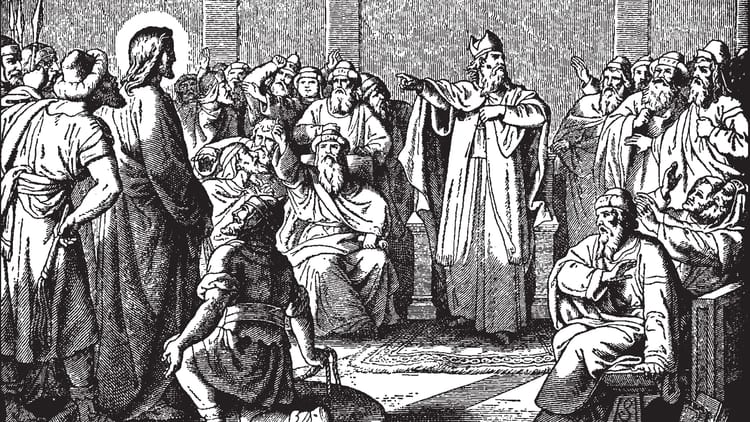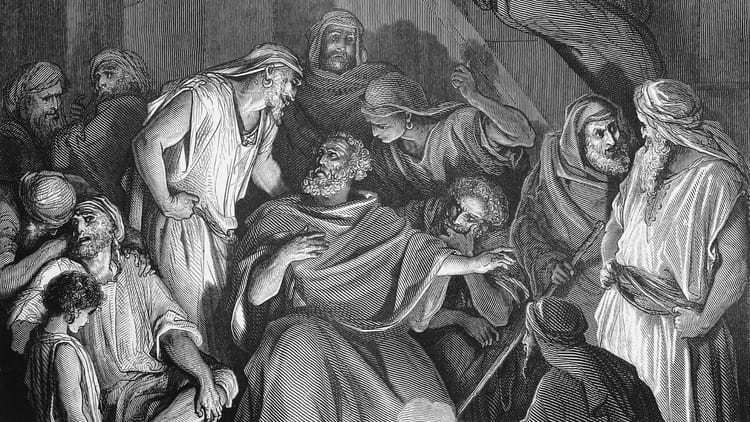The Model for Giving (Mark 12:41-44)

Big Idea: True generosity is not defined by the quantity of what is given but by the sacrifice and trust it embodies.
My name is Thaddaeus. I know, I know – who is Thaddaeus? Everyone knows the other apostles – Simon Peter, James and John, etc. But I was there – look me up! I'm even mentioned two times in the Scripture as one of the twelve. I think I have an image problem.
I'm here this morning to tell you about a story that revolutionized my life. It caused me to look at people very differently, and it caused me to give to God's work in a very different way. But I'm getting ahead of myself.
It was the last week of Jesus' life. During Passover week, Jerusalem was bustling, and Jesus was extremely popular. Throngs of people gathered to follow him. Wherever Jesus roamed, he drew significant attention. You wouldn't believe the excitement!
I'll never forget the day he entered the temple and cleared the Court of the Gentiles. That got him a little bit of attention! I will always remember how the city's intellectual elite confronted this uneducated man with a strong Galilean accent. Obviously a man of little education, but he was more than their equal! I'll tell you, that was an unforgettable week in my life!
But one day, Jesus drew away from the crowds. He exposed the teachers of religious law, warning them about their craving for attention, desire for prestigious seats in synagogues, banquets, and their eye-catching robes. Meanwhile, they're shamelessly cheating widows out of their property, and the next minute offering long prayers in public. "Hypocrites!" Jesus said. He had no time for them.
But then he took us away from the crowds, and we sat on the steps of the Court of Women within the temple. The temple was packed with people. We sat and people-watched. It's interesting to observe people as they come and go, with their expressions and varying levels of urgency. Some rush by, while others seem unaware of their surroundings. I love to people-watch, and it was always very interesting to people-watch with Jesus.
Surrounding the Court of Women, there were thirteen shofars. They were trumpet-shaped boxes into which people threw their money. There were seven shofars for the temple tax, and six for freewill offerings. It always made me laugh. Pious religious people lined up to give a gift. They would stand in line, walk up to the receptacle, and announce the amount of the gift and the purpose. And the priest would yell back the amount and the purpose. Some people took their gifts and broke them down into as many coins as possible. You get the idea – $100, all in pennies. Click, click, click, click.
We were quite poor, and I was a bit impressed by the large donations being made. We certainly couldn't afford to give the way they were. We saw people lining up to donate to the thirteen receptacles as the priests announced the gift amounts.
I have to admit I didn't notice the lady until Jesus pointed her out. She was old, and she shuffled along in the crowds, oblivious to all that was going on around her. We found out later that she was a destitute widow. She was not just poor; she was in abject poverty. Rumor has it that she had even been financially abused by the religious teachers of the law.
But she shuffled along and entered the line to contribute to the temple. We watched her as she made her way to the front. The self-righteous stood in front of her and behind her, armed with gold and silver, ready to demand God's presence. They gave their tithes. But slowly, she made her way to the front as we strained to hear. She dropped some money in the shofar, and we couldn't hear her announcement of what she gave. The money certainly didn't make a racket as she dropped it in.
And then we heard the priest yell out, "Two lepta!" Two lepta? They were the smallest coins in circulation. They were worth almost nothing – worth less than 1/100 of a denarius, or five minutes labor at minimum wage! It was the minimum amount that you were allowed to give. The gift was unimpressive, and we felt embarrassed for the old woman as she walked away.
But as she left, Jesus pointed at her and said, "The plain truth is that this widow has given by far the largest offering today. All these others made offerings that they'll never miss; she gave extravagantly what she couldn't afford—she gave her all!"
Was the two lepta the most significant contribution made that day? The most extravagant gift that was offered? While others continued making large donations and the old woman disappeared into the crowd, I began to think about it. It struck me that those who were tithing thought they were giving well. And here was a woman who gave an inconsequential amount and walked away, viewing her gift as a failure. And yet she gave the most extravagant gift of them all.
Reflections on Giving
It began to hit me at that moment that she modeled a different way to give.
Some giving requires little effort, while other giving demands a significant sacrifice.
Here I was watching all the wealthy people come and give their offerings. Meanwhile, they weren't even thinking of their gifts! They weren't financially needy people. I suspect that their minds were on the families and meals that were waiting for them as soon as they finished their temple duty.
Don't get me wrong – they gave, but their giving wasn't a sacrifice. They generously gave, yet still had plenty left to spare. But then this one old woman comes up and gives a meager amount, and yet it was her all. Sometimes a little gift costs a great deal more than big gifts do.
I began to think about this issue of sacrifice. And I began to wonder, how many people give to God's work in such a way that their gift is not sacrificial? They may give the prescribed amount, but their gift is such a small percentage of their resources that they hardly miss it at all.
I have to admit that I've given more than once to the temple without really thinking about it. Oh sure, I could have done other things with the money, but I wasn't really sacrificing. It didn't affect my lifestyle that much. But here was a woman who gave in such a way that she had nothing left. It was the height of generosity.
I don't know your financial situation today. It's not really my place to meddle – after all, I am from the first century! But I've noticed an interesting thing. The more resources one has, the less they tend to give to God's work. I've found that when people's income rises, their percentage of charitable contributions drop.
After hearing Jesus speak about the widow, my question is: Are you giving a lot without much sacrifice, or are you giving in a way that really costs you? I still remember the words of King David, "I will not offer to the Lord that which costs me nothing!" Does your giving really cost you?
There's another way of looking at giving.
Some giving focuses on how much one gives, and some focuses on how much is left over.
I was impressed by the number of gifts given, but true generosity is not about how much we give; it’s about how much we keep.
I looked at the size of the gifts, and to tell you the truth, the widow's offering wasn't that impressive. But it became really impressive when I saw how little she had left over. Jesus looked not at the amount of the gift; he looked at how much was left over at the end.
I've got to be honest with you. Many of you were taught the principle of tithing. But for many of you, giving 10% of your income is no test of faith. It's not a risk. You still have more than you need left over. How much do you have left over after you give?
The truth is, God owns it all. He's the one who gave you all that you have. Everything that you have is his. Jesus once told us the story of a man who had a really good crop. So he decided, with his profits, he would tear down all his barns and build bigger ones. It's like someone receiving a large sum of money and choosing to buy a new car or remodel their house.
He said to himself, "Self, you've done well! You've got it made and can now retire. Take it easy and have the time of your life!" But then God said, "Fool! Tonight you die. Who will inherit the vast collection of goods stored in your barn?" And I still remember what Jesus said to conclude the story: "That's what happens when you fill your barn with self and not with God."
Are you filling your barns with self-centered pursuits or with the richness of God? If you're tithing but only focusing on your own wealth and success, you've made a mistake. God is going to say to you, "You fool." Our faithfulness depends not on what we give, but on how much we keep. How much are you keeping behind?
Well, there are two more ways of giving.
Some giving comes from rule-keeping, and some comes from the heart.
The people who were offering up their gifts weren't all that bad—they were all tithing. They were keeping the rules as far as giving went. I always used to think that as long as you tithed, you were giving enough.
But that's the problem with giving according to a formula. It's possible to give a certain amount, and yet have the heart ripped right out of the process of giving. Giving becomes perfunctory and mechanical. However, the widow contributed with genuine, heartfelt compassion. She poured her heart and soul into it! What a challenge to me.
That great teacher, Paul, tells us later in the Scriptures that everyone should make up their own mind about what they give. In other words, don't just follow a formula. Pray about it. He advised us not to give reluctantly or in response to pressure, because God loves the person who gives cheerfully.
The attitude is more important than the amount. God is concerned about how we give as much as he is concerned about what we give. When you donate, do you do it like others who contribute to the temple, following a set formula? Or do you give from the heart, like that poor widow who gave it all? Do you give out of rule-keeping, or do you give as a spiritual act of service?
Well, I really have thought about what happened a lot. And one other distinction popped into my head as well. And it's this:
Some giving requires trust in God, and some doesn't need to.
I wonder what was going on in that widow's mind as we watched her go away. She had just given the last of her meager resources. With no husband, and no income, how would she make ends meet? How could she give the last of what she had? But as I saw Jesus point to her, I couldn't help but think, "Will God not meet the needs of such a woman?" How many of us really think, that after giving so sacrificially, God did not meet her needs? I somehow think God was more faithful to her than any of us could imagine.
I'm ashamed of the times that I've given God only what I thought I could afford. It never occurred to me to give in such a way that I would have to trust God to provide. I was giving in such a way that I didn't need to trust God. There was more than enough money left over to provide for all of my needs and wants.
So let me ask you: does your giving demonstrate a trust in God to provide all of your needs? Or do you give in such a way that God has to step in and provide for you?
Since that day, I've found that the people who give the most to God are the ones God blesses most. Oh, I'm not saying that they're the richest financially – but make no mistake about it, they are the richest. As somebody from your century has said, "He is no fool who gives what he cannot keep to gain what he cannot lose."
Jesus pointed to her and said, "The truth is that this widow has given the biggest offering today. All these others made offerings that they'll never miss; she gave extravagantly what she couldn't afford—she gave her all!"
As you give to God in a few minutes, let me ask you again: does your giving really cost you? How much are you not giving? How much is left behind? Are you giving out of rule-keeping, or from the heart? And are you demonstrating a trust in God? Are you giving half as generously as the widow who gave just two lepta?
Let's pray.
Each man should give what he has decided in his heart to give, not reluctantly or under compulsion, for God loves a cheerful giver. And God is able to make all grace abound to you, so that in all things at all times, having all that you need, you will abound in every good work. (2 Corinthians 9:7-8)
I pray that when Jesus sees our giving, both today and always, he finds us to be joyful, generous givers who understand that God provides us with all we need to do good works. In Jesus' name, Amen.





